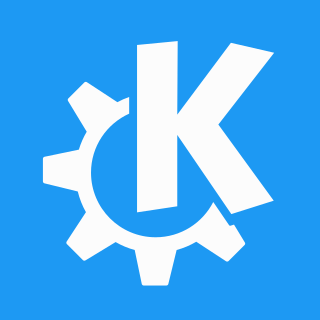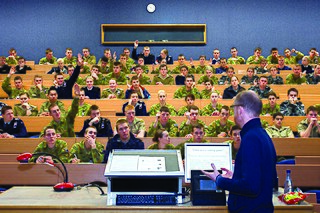
Bruce Perens is an American computer programmer and advocate in the free software movement. He created The Open Source Definition and published the first formal announcement and manifesto of open source. He co-founded the Open Source Initiative (OSI) with Eric S. Raymond. Today, he is a partner at OSS Capital.

KDE is an international free software community that develops free and open-source software. As a central development hub, it provides tools and resources that allow collaborative work on this kind of software. Well-known products include the Plasma Desktop. Frameworks and a range of cross-platform applications like Krita or digiKam designed to run on Unix and Unix-like desktops, Microsoft Windows, and Android.

The Open Source Initiative (OSI) is the steward of the Open Source Definition, the set of rules that define open source software. It is a California public-benefit nonprofit corporation, with 501(c)(3) tax-exempt status.

Open-source software (OSS) is computer software that is released under a license in which the copyright holder grants users the rights to use, study, change, and distribute the software and its source code to anyone and for any purpose. Open-source software may be developed in a collaborative public manner. Open-source software is a prominent example of open collaboration, meaning any capable user is able to participate online in development, making the number of possible contributors indefinite. The ability to examine the code facilitates public trust in the software.

Processing is a free graphical library and integrated development environment (IDE) built for the electronic arts, new media art, and visual design communities with the purpose of teaching non-programmers the fundamentals of computer programming in a visual context.

A lecture is an oral presentation intended to present information or teach people about a particular subject, for example by a university or college teacher. Lectures are used to convey critical information, history, background, theories, and equations. A politician's speech, a minister's sermon, or even a business person's sales presentation may be similar in form to a lecture. Usually the lecturer will stand at the front of the room and recite information relevant to the lecture's content.

Free and Open source Software Developers' European Meeting (FOSDEM) is a non-commercial, volunteer-organized European event centered on free and open-source software development. It is aimed at developers and anyone interested in the free and open-source software movement. It aims to enable developers to meet and to promote the awareness and use of free and open-source software.

Open educational resources (OER) are teaching, learning, and research materials intentionally created and licensed to be free for the end user to own, share, and in most cases, modify. The term "OER" describes publicly accessible materials and resources for any user to use, re-mix, improve, and redistribute under some licenses. These are designed to reduce accessibility barriers by implementing best practices in teaching and to be adapted for local unique contexts.

Free and open-source software (FOSS) is a term used to refer to groups of software consisting of both free software and open-source software where anyone is freely licensed to use, copy, study, and change the software in any way, and the source code is openly shared so that people are encouraged to voluntarily improve the design of the software. This is in contrast to proprietary software, where the software is under restrictive copyright licensing and the source code is usually hidden from the users.

LinuxWorld Conference and Expo was a conference and trade show that focused on open source and Linux solutions in the information technology sector. It ran from 1998 to 2009, in venues around the world.

The free-culture movement is a social movement that promotes the freedom to distribute and modify the creative works of others in the form of free content or open content without compensation to, or the consent of, the work's original creators, by using the Internet and other forms of media.
A Freedom Toaster is a public kiosk that will burn copies of free software onto user-provided CDs and DVDs.

Benjamin Mako Hill is a free software activist, hacker, author, and professor. He is a contributor and free software developer as part of the Debian and Ubuntu projects as well as the co-author of three technical manuals on the subject, Debian GNU/Linux 3.1 Bible, The Official Ubuntu Server Book, and The Official Ubuntu Book.

PulseAudio is a network-capable sound server program distributed via the freedesktop.org project. It runs mainly on Linux, various BSD distributions such as FreeBSD and OpenBSD, macOS, as well as Illumos distributions and the Solaris operating system.

The Linux Foundation (LF) is a non-profit technology consortium founded in 2000 as a merger between Open Source Development Labs and the Free Standards Group to standardize Linux, support its growth, and promote its commercial adoption. Additionally, it hosts and promotes the collaborative development of open source software projects. It is a major force in promoting diversity and inclusion in both Linux and the wider open source software community.

Free content, libre content, libre information, or free information, is any kind of functional work, work of art, or other creative content that meets the definition of a free cultural work.

Karen Sandler is the executive director of the Software Freedom Conservancy, former executive director of the GNOME Foundation, an attorney, and former general counsel of the Software Freedom Law Center.

Freeseer is a cross-platform screencasting application suite released as free and open-source software. Freeseer is a project of the Free and Open Source Software Learning Centre (FOSSLC), a not-for-profit organization.
Open source is source code that is made freely available for possible modification and redistribution. Products include permission to use the source code, design documents, or content of the product. The open-source model is a decentralized software development model that encourages open collaboration. A main principle of open-source software development is peer production, with products such as source code, blueprints, and documentation freely available to the public. The open-source movement in software began as a response to the limitations of proprietary code. The model is used for projects such as in open-source appropriate technology, and open-source drug discovery.

















